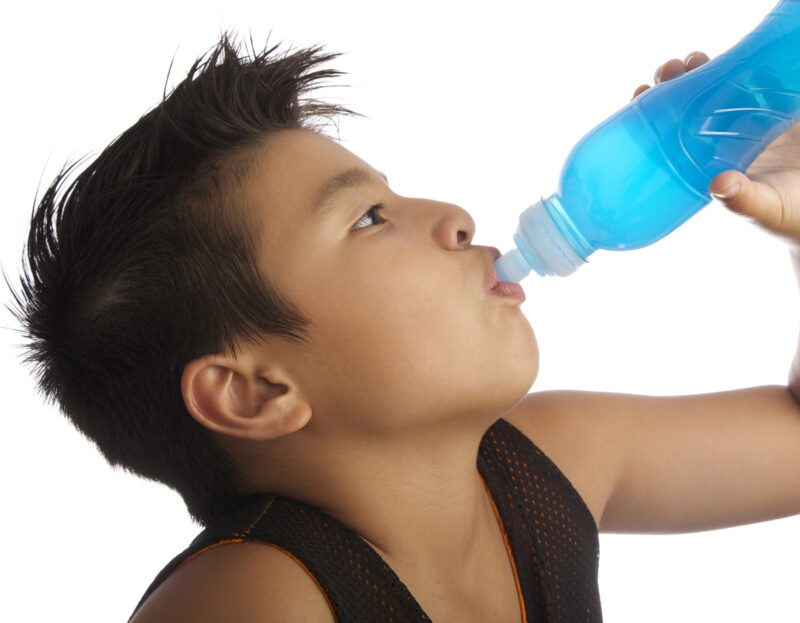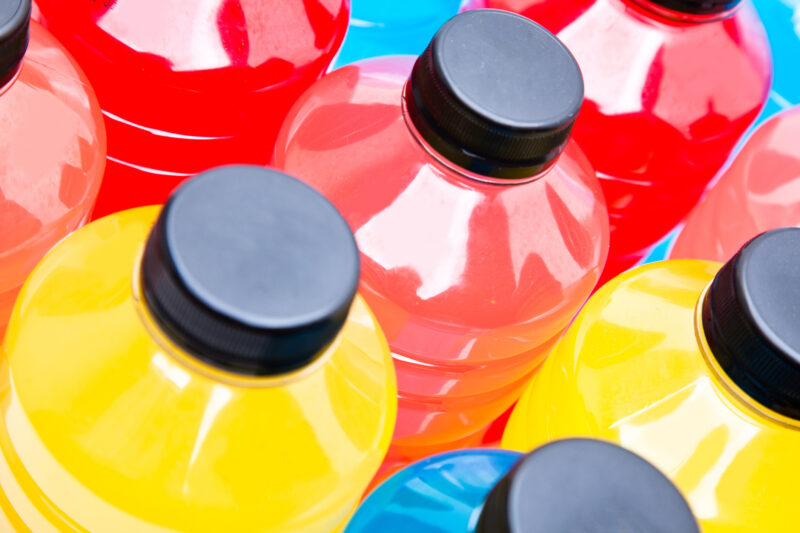
Sports drinks or powdered mixes that add electrolytes to the diet are especially important for active kids.
Fainting (syncope) is common in children and teens, according to Dr. Timotheus Watson, a pediatric cardiologist at Akron Children’s.
“Most children faint due to a brief drop in blood pressure, which temporarily decreases blood flow to the brain,” he says. “This blood pressure change results in passing out. Fortunately, most episodes of fainting are not caused by structural heart disease.”
Episodes preceded by feelings of nausea, vision changes, ringing in ears, and feeling warm support that the fainting episode was simply related to a blood pressure drop, noted Dr. Watson. The frequency of fainting episodes often decreases with time and improving hydration can help prevent future episodes.
To minimize your child’s risk of fainting, here are some key principles of hydration:
- Your child should start the day drinking at least 16 ounces of water in the morning, ideally before leaving for school. Many children do not hydrate well enough in the morning which leads to symptoms that can disrupt school activities.
- At least 30 ounces of fluid throughout the late morning and early afternoon is recommended.
- Your child should drink 16 ounces of fluid in the evening.
- Watson recommends children drink an electrolyte-containing beverage throughout the day, especially if they are physically active. Electrolytes (primarily sodium AKA salt) help maintain blood pressure and prevent episodes of fainting.
“Electrolytes are commonly found in drinks like Powerade/Gatorade Zero,” Dr. Watson said. “Electrolyte powder can be mixed with water to add extra salt as well. Some popular electrolyte powders include the brands Liquid IV, Pedialyte Sport, DripDrop Dehydration Relief or there are quite a few generic electrolyte powder packets sold at retailers like Target and Walmart. Electrolyte powders/supplements often taste salty and this is to be expected. Try different flavors and brands to determine which ones your child prefers.

Dr. Timotheus Watson sees patients in Beachwood, Boardman, Warren and North Canton.
- Your child’s urine color is a good indicator of his or her hydration level. “Urine should be clear in color if you are hydrating appropriated,” said Dr. Watson. “You need to increase your hydration more if your urine is yellow or dark yellow. Symptoms rarely improve if the urine is still yellow. You will be urinating more with the recommended hydration strategies. Encourage your child to proactively take bathroom breaks in between classes, before and after lunch and prior to getting in the car for travel.”
- Certain foods can also help prevent fainting. Eating healthy foods that contain salt can help by improving the sodium levels in the blood. Pickles/pickle juice, broth/soups, olives, and salted nuts (provided the child does not have an allergy) are foods with higher sodium content if fainting is a concern.
- Stand up slowly if you have been sitting/lying down for a prolonged period of time. Quick changes in position can contribute to an episode of fainting. Sit down immediately and request that someone bring you drink – at least 16 ounces of water/electrolyte beverage if you ever feel like you are going to faint when standing up or getting up from a lying position.
- Lifting moderately heavy weights that require you to strain can help boost your blood pressure, especially in the morning. Place 2 dumbbells that are heavy enough that you cannot do more than 15 repetitions without rest. Sit on the side of your bed, and do arm curls with the weights to wake your blood pressure system up.
- There are several scenarios where increased hydration/electrolyte intake is paramount, including settings where you will be standing for prolonged period of time: Amusement park lines, church/religious ceremonies, funerals, graduations, ROTC, during rest times for certain sports.
- You should hydrate well before immunizations and blood draws. Sometimes the painful sensation related to these medical procedures can cause fainting and dizziness.
- Athletes should hydrate well throughout the day starting with significant hydration before physical activity. Electrolyte beverages are key before, during, and after physical activity.
- Avoid beverages with caffeine.
Sense a syncope episode coming on? The best bet is to get to the ground/floor and elevate your legs (above your heart). After a few minutes, sit up slowly and drink water or any fluid available.











